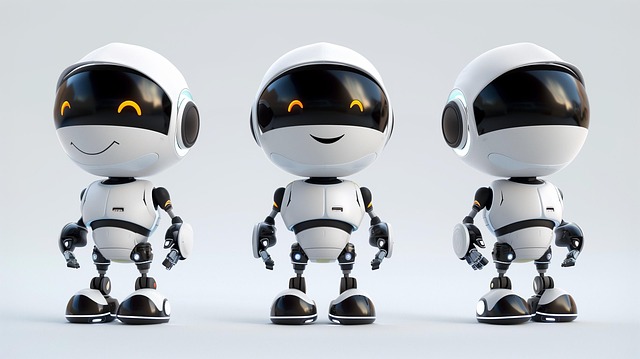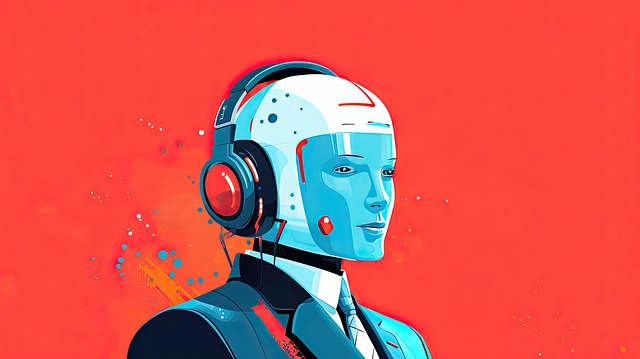“Dive into the captivating world of AI chatbots and their transformative impact on various industries. This article explores the intricate mechanics and vast applications of these intelligent assistants, from enhancing customer service interactions to unlocking creative heights with generative AI. We delve into the functionality, ethical nuances, and future prospects of AI chatbots, shedding light on how they’re revolutionizing communication and support systems.”
- Understanding AI Chatbots: Their Functionality and Applications
- Generative AI: Unlocking Creative Possibilities with Language Models
- The Impact of AI Chatbots on Customer Service and Support
- Ethical Considerations and Challenges in AI Chatbot Development
- Future Trends: Enhancing User Experiences with Advanced AI Technologies
Understanding AI Chatbots: Their Functionality and Applications

AI chatbots are sophisticated digital assistants designed to mimic human conversation, offering a range of functionalities from answering queries to generating content. They leverage natural language processing (NLP) and machine learning algorithms to understand and respond to user inputs in a contextually relevant manner. These chatbots can be integrated into various platforms, such as websites, mobile apps, and messaging services, enhancing customer support, streamlining communication, and automating repetitive tasks.
The applications of AI chatbots are vast and varied. They’re used in customer service to handle initial inquiries, book appointments, or even make product recommendations. In education, they can provide personalized tutoring, answer student questions, and offer study resources. Creative professionals benefit from their content generation capabilities, while businesses use them for marketing, lead generation, and market research by analyzing customer interactions.
Generative AI: Unlocking Creative Possibilities with Language Models

Generative AI represents a significant leap forward in artificial intelligence, particularly for AI chatbots. By leveraging advanced language models, this technology has the power to create content that is not only contextually relevant but also highly creative and unique. These models can generate diverse texts, from poetry and stories to product descriptions and marketing copy, opening up a world of possibilities for content creators and businesses alike.
The integration of generative AI into chatbot development allows for more dynamic and engaging interactions. Chatbots equipped with these capabilities can now offer personalized responses, adapt conversations based on user inputs, and even contribute to the generation of new ideas and trends. This not only enhances user experiences but also pushes the boundaries of what’s achievable in human-machine interaction, making AI chatbots increasingly versatile and indispensable tools in various industries.
The Impact of AI Chatbots on Customer Service and Support

AI chatbots are transforming customer service and support, offering round-the-clock assistance and immediate responses to customer queries. They can handle a high volume of simple to complex requests, from providing product information and troubleshooting to booking appointments and resolving basic issues. This not only improves customer satisfaction by speeding up response times but also allows human agents to focus on more complex and nuanced tasks that require empathy and critical thinking.
Furthermore, generative AI is enhancing these chatbot capabilities by enabling them to create tailored content, such as personalized product recommendations or engaging stories, based on user interactions. This level of customization improves the customer experience, fostering stronger relationships between users and brands. As AI chatbots continue to evolve, they are set to play an increasingly vital role in shaping the future of customer service and support.
Ethical Considerations and Challenges in AI Chatbot Development

As AI chatbots continue to evolve and become more integrated into our daily lives, ethical considerations and challenges in their development have gained significant attention. One major concern is bias and fairness—AI chatbots can inadvertently perpetuate or amplify existing societal biases present in their training data. This can lead to discriminatory outcomes, especially when these systems are used for tasks like hiring, lending, or law enforcement. Ensuring transparency and accountability in chatbot development processes is crucial to mitigating such risks.
Another challenge lies in privacy and data security. AI chatbots often process vast amounts of user data, including sensitive personal information. Developers must implement robust measures to protect this data from breaches or misuse. Additionally, the potential for misinformation and disinformation is a growing worry. Generative AI models, in particular, can create highly convincing yet false content, posing challenges for content moderation and verification. Addressing these ethical considerations requires collaboration between developers, policymakers, and researchers to establish guidelines and standards that prioritize user safety, privacy, and responsible AI development.
Future Trends: Enhancing User Experiences with Advanced AI Technologies

The future of AI chatbots is poised for immense growth and innovation, driven by advancing generative AI technologies. One of the key trends is the integration of advanced natural language processing (NLP) capabilities, enabling chatbots to understand and generate human-like text with remarkable accuracy. This enhancement will lead to more engaging and intuitive conversations, allowing users to interact naturally without feeling the presence of a machine.
Furthermore, personalized experiences are set to become the norm as AI algorithms learn and adapt to individual user preferences. By analyzing vast amounts of data, these chatbots can offer tailored recommendations and solutions, creating a unique and satisfying experience for each user. This shift towards customization will not only increase customer satisfaction but also foster stronger user-AI interactions.
AI chatbots and generative AI are transforming various industries, offering unprecedented opportunities for innovation. From enhancing customer service interactions to unlocking creative potential, these technologies are here to stay. As we look ahead, ethical considerations and continuous advancements in technology will shape the future of AI chatbots, promising even more sophisticated user experiences. Embracing these changes will be key for businesses aiming to stay competitive in the digital age.
